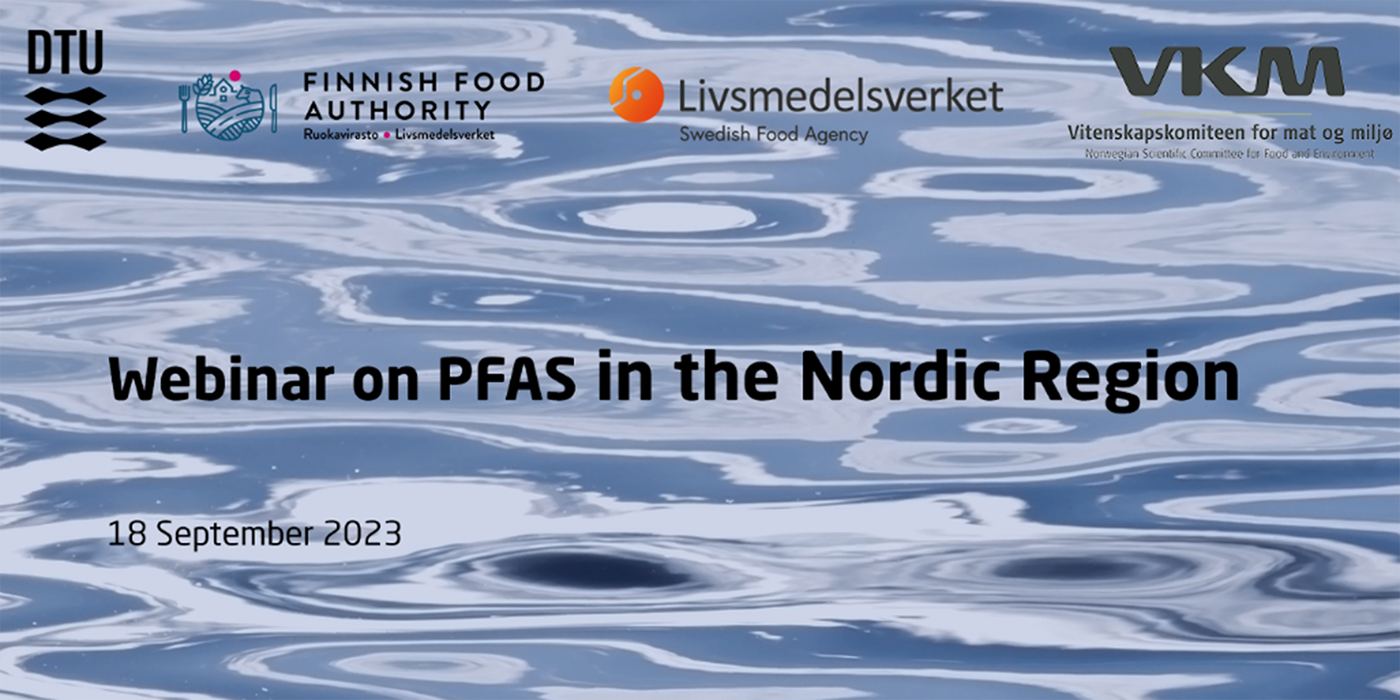PFAS covers a wide range of fluorine substances that have been used for decades and is still used in a myriad of products. The substances, also known as the ‘Forever Chemicals’, are chemically extremely stable and continuously accumulate in humans and animals and elsewhere in the environment where they can pose a risk to animal and human health.
At a webinar the 18 September 2023 researchers, food and chemical authorities will discuss the current knowledge on PFAS in the Nordic Region. How does PFSA affect health? What are the risks? Where is PFAS found and to what extent? What are the authorities doing and how is it possible to remove or avoid a PFAS? What do we not know and need more knowledge about?
The webinar is jointly organized between Danish DTU National Food Institute (DTU Fødevareinstituttet), Finnish Food Authority (Ruokavirasto, Livsmedelsverket), Norwegian Scientific Committee for Food and Environment (Vitenskabskomiteen for mat og miljø) and Swedish Food Agency (Livsmedelsverket).
Time
18 September 2023, 9-15 PM CET
Location
Online (You will receive a link the day before the webinar)
Program
See the preliminary program below.
Registration
Participation is free, however registration is necessary no later than 16 September 2023. Please register on the DTU National Food Institute’s webpage.
Contact
kommunikation@food.dtu.dk
Preliminary programme
Moderator: Christine Nellemann, Director of the DTU National Food Institute, Denmark
9.00-10.30 PM CET
Opening speech: Human health risks and main concerns of PFAS
Anne Marie Vinggaard, Professor, DTU National Food Institute, Denmark
Risk assessments in the Nordic region
Health risks after high exposure to PFAS in drinking water. Experiences from Ronneby, Sweden
Kristina Jakobsson, Professor, School of Public Health and Community medicine, Sahlgrenska Academy Universit of Gothenburg, Sweden
PFAS in Finland – dietary exposure, with focus on occurrence in fish
Johanna Suomi, Research Professor. Finnish Food Authority
PFAS in food and migration from food contact materials into real food, Denmark
Kit Granby, Associate Professor, DTU National Food Institute, Denmark
Production of paper products identified as the main source of PFAS in polluted fish
Håkon A. Langberg, Senior Researcher, The Norwegian Geotechnical Institute
10.30-10.45 PM CET
Break
10.45-12.30 PM CET
Where the consumer meets PFAS in everyday life
Line Småstuen Haug, Norwegian Institute of Public Health
Overview of risk management and monitoring in the Nordic region
Overview of monitoring and risk management of PFAS in Denmark and regulatory foresights at the EU level
Henrik Søren Larsen, Head of Office, Ministry of Environment of Denmark
Fish meal from wild fish in organic egg production – PFAS findings in Finland, a risk management case
Riitta Rannikko, Senior Specialist, Finnish Food Authority
Risk management of PFAS in Norway
Julie Tesdal Håland, Senior Adviser, The Norwegian Food Safety Authority, Head Office, Chemical food safety
PFAS in food - how does environmental contamination affect food production and human exposure?
Karl Lilja, Swedish Environmental Protection Agency
Temporal trends of PFAS concentrations in dated sediment cores from Finland and Baltic Sea
Ville Junttila, Researcher, Finnish Environment Institute
12.30-13.15 PM CET
Break for lunch
13.15-15.00 PM CET
What more can be done?
PFAS - From hero to villain to criminal
Stig Valdersnes, Senior Researcher, Institute of Marine Research, Norway
PFAS treatment techniques – Needs for the future?
Lutz Ahrens, Professor in Environmental Organic Chemistry, Department of Aquatic Sciences and Assessment, Swedish University of Agricultural Sciences
Proposal for a broad PFAS restriction in EU
Jenny Ivarsson, Strategic Advisor, Swedish Chemicals Agency (KEMI)
Closing remarks on future perspectives - a world without PFAS?
Harald Gjein, Director at Norwegian Scientific Committee for Food and Environment
Helen Brunnkvist, Head of Department, and Emma Halldin Ankarberg, Toxicologist, Swedish Food Agency
Pia Mäkelä, Head of Department, Finnish Food Authority
Christine Nellemann, Director of the DTU National Food Institute, Denmark
